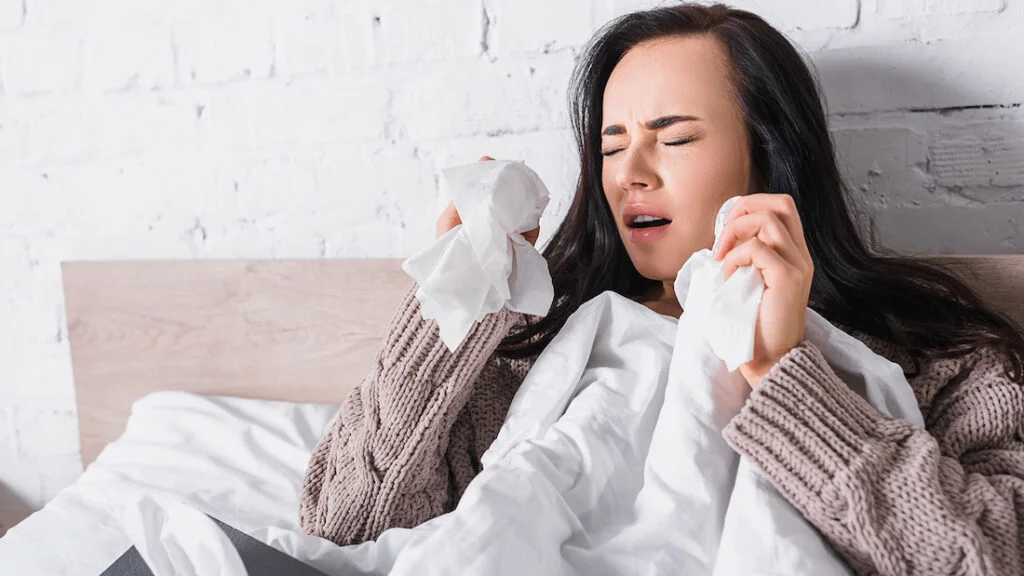
You may be able to walk in your sleep, but what about sneezing? It’s a good question! Research into sneezing during sleep is limited, so we spoke with Dr. Laura Purdy, MD, about whether it’s possible to sneeze in your sleep, why it might be a little different than when you’re awake, and what you can do to keep nighttime sneezes at bay.
Long Story Short
- It is possible to sneeze in your sleep, but certain sleep stages can mean nighttime sneezes aren’t as intense or as frequent as they are when you’re awake.
- To prevent sneezing in your sleep, make sure to keep your bedding clean, avoid sleeping with pets, run an air purifier in your bedroom, and use a nasal rinse before bed.
Can You Sneeze In Your Sleep?
You may have no recollection of it, but there’s a chance that you’ve sneezed in your sleep before. “Sneezing in your sleep is definitely possible and may occur at any stage in sleep,” Purdy tells Sleepopolis. There aren’t many studies about sneezing during sleep, but some evidence suggests that sneezing is most unlikely to occur during rapid eye movement sleep, or REM (1). That’s because of a phenomenon known as muscle atonia, in which many of the muscles in the body are temporarily paralyzed. Keep in mind, however, people move between different sleep cycles while they sleep. That means it is possible to sneeze during sleep, just as Dr. Purdy suggests.
Sneezing and the Sleep Stages
Sleep is a highly structured process that can be broken down into four cycles, each lasting roughly 90 minutes. Each cycle includes three stages of non-rapid eye movement sleep or NREM, plus one stage of REM.
“No specific sleep stages prohibit sneezing,” Purdy tells Sleepopolis, and it’s true that there is currently no scientific evidence to the contrary. “However, during REM sleep muscle activity is inhibited to stop us acting out our dreams.” It’s possible that during this stage, we aren’t as aware of the tickling sensation that would otherwise signal the brain to induce sneezing. “This might affect intensity or frequency of sneezing during this stage as opposed to wakefulness or NREM sleep,” says Purdy. That’s why it’s generally thought that sneezing during REM is unlikely, if not outright impossible.
Why We Sneeze
Sneezing is a biological response from the body to help clear nasal passages. Substances like animal dander, dirt, bacteria, dust, mold, pollen, smoke, even fragrances like perfume can all trigger sneezing. The act of sneezing is designed to expel these substances.
“Your sensory nerves in your nasal lining send a signal to your brain, which then triggers muscle contractions including diaphragm and chest contractions and forces air out through both nose and mouth in an expulsion action,” explains Purdy.
Do Children Sneeze in Their Sleep?
Just like adults, children can sneeze while they’re sleeping, depending on their sleep cycle. In fact, they may even be more prone to it. “Children tend to have more sensitive respiratory systems and may be susceptible to allergies and upper respiratory infections that might increase sneezing at nighttime,” says Purdy.
Other Urges Suppressed By Sleep
As you might imagine, it’s not just sneezing that can be affected by sleep. “Sleep can suppress various urges or reflex actions that tend to occur naturally during wakefulness,” says Purdy. She lists a few involuntary urges that can be suppressed, including:
- Coughing
- Hiccups
- Thirst
- Hunger
- Bathroom urges
“Sleep specialists believe this suppression helps preserve restful restful slumber while minimizing disruptions,” she says. “However, if significant discomfort or need arises due to an underlying medical condition, it can still impede quality restful slumber.” People dealing with the common cold or allergies, which can include symptoms like post-nasal drip, may be experiencing disrupted sleep. In fact, according to one study, there’s a positive association between allergy symptoms and sleep disorders (2). Because cold and allergy symptoms may prevent people from reaching the most restful stages of sleep, they may be more likely to notice bodily urges than they would if they were sleeping soundly.
Preventing Sneezing At Night
If the idea that you may be sneezing all over your bedding at night is unappealing and you want to take steps to prevent the possibility of sneezing at night, you have a few options. While Purdy points out that it can be a challenge to avoid nighttime sneezing when it’s triggered by allergies or nasal congestion, she suggests a few strategies.
- Keep the sleeping environment free of allergens. That means washing your sheets regularly and possibly even upgrading to hypoallergenic bedding. According to one study, this type of exposure control can be an effective way to reduce allergens (3). You may also want to keep pets out of your bed.
- Use an air purifier. Running an air purifier in your bedroom can help reduce contaminants that may trigger sneezing. Just remember to keep the windows closed.
- Use a nasal saline rinse before bed. Rinsing your nasal passages before bed can flush away potential irritants that could trigger sneezing in the night.
Purdy also advises consulting with your healthcare provider, who can offer specific advice about managing sneezing while you sleep.
FAQs
Can you sneeze in your sleep without waking up?
It is possible to sneeze yourself awake, but you’re just as likely to sleep through it. “Sneezing during sleep may not always lead to complete wakefulness; in many instances it simply acts as an unconscious reflexive response from your body, sometimes without disrupting or briefly awakening you completely,” says Purdy. Still, she says that loud or particularly forceful sneezes have the potential to rouse you.
Can you cough or sneeze in your sleep?
Yes, you can cough and sneeze in your sleep. However, the sleep stage itself has an impact. “During REM sleep, muscle activity is inhibited to stop us acting out our dreams; this might affect intensity or frequency of sneezing during this stage as opposed to wakefulness or NREM sleep,” says Purdy.
Can sneezing be caused by CPAP?
While CPAP therapy shouldn’t directly cause sneezing, Purdy says that some people may experience nasal irritation or congestion caused by their mask/air pressure combination that could lead to symptoms like sneezing. That aligns with the findings of one small study on people with allergy symptoms who use CPAP therapy, whose nasal congestion symptoms didn’t improve or actively worsened (4). If that’s the case, Purdy suggests adjusting mask fit, using humidification systems, or discussing alternative treatment solutions with healthcare professionals to help minimize these side effects and provide relief.
The Last Word From Sleepopolis
It is possible to sneeze while you’re sleeping — even if you don’t realize you’re doing so. It’s most likely happening during the lighter stages of sleep. During REM sleep, muscle activity is inhibited, which could have a dampening effect on involuntary urges like sneezing. Still, if you’re worried about sneezing at night, switch to hypoallergenic bedding, make a point of washing your sheets regularly, and run an air purifier at night.
Sources
Personal interview, Dr. Laura Purdy. July 2024.
1. Geeta, G. and Verma, A. (2017). Sneezing: Physiological Facts and Beliefs. Journal of the Association of Physicians in India. https://japi.org/article/files/sneezing_physiological_facts_and_beliefs.pdf.pdf
2. Xi, Y., Deng, YQ., Chen, SM. et al. Allergy-related outcomes and sleep-related disorders in adults: a cross-sectional study based on NHANES 2005–2006. Allergy Asthma Clin Immunol 18, 27 (2022). https://doi.org/10.1186/s13223-022-00669-z
3. Cipriani F, Calamelli E, Ricci G. Allergen Avoidance in Allergic Asthma. Front Pediatr. 2017 May 10;5:103. doi: 10.3389/fped.2017.00103. PMID: 28540285; PMCID: PMC5423906.
4. Skirko JR, James KT, Shusterman DJ, Weaver EM. Association of Allergic Rhinitis With Change in Nasal Congestion in New Continuous Positive Airway Pressure Users. JAMA Otolaryngol Head Neck Surg. 2020 Jun 1;146(6):523-529. doi: 10.1001/jamaoto.2020.0261. PMID: 32271366; PMCID: PMC7146531.


























